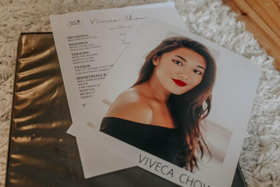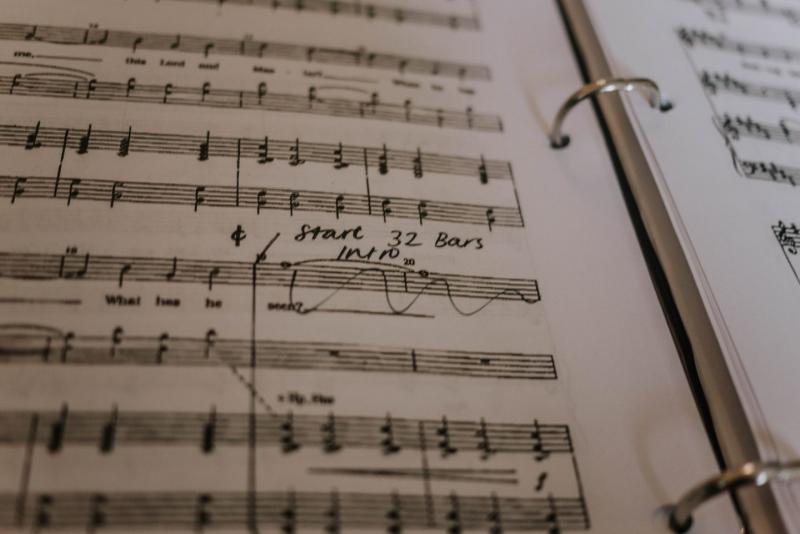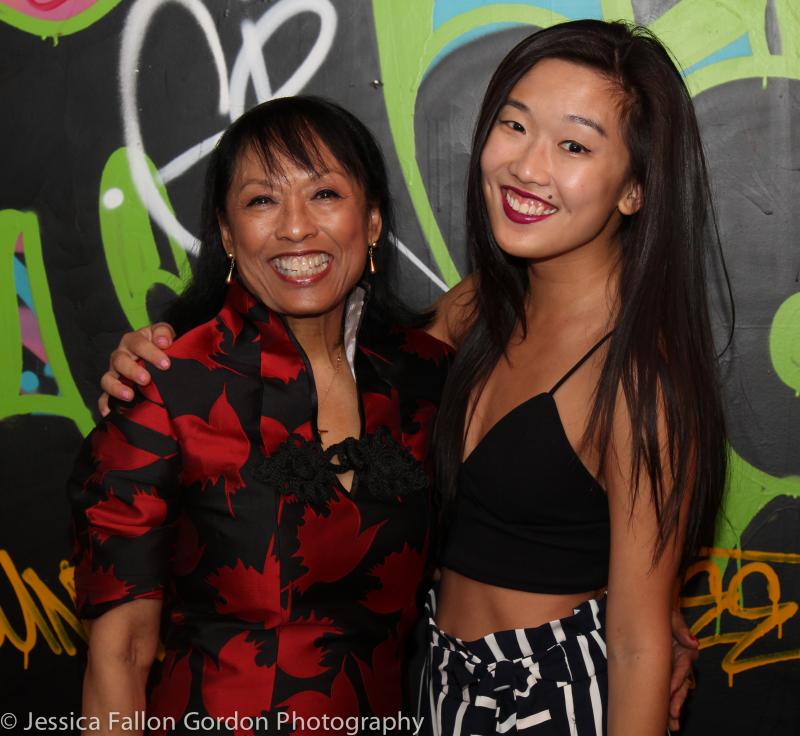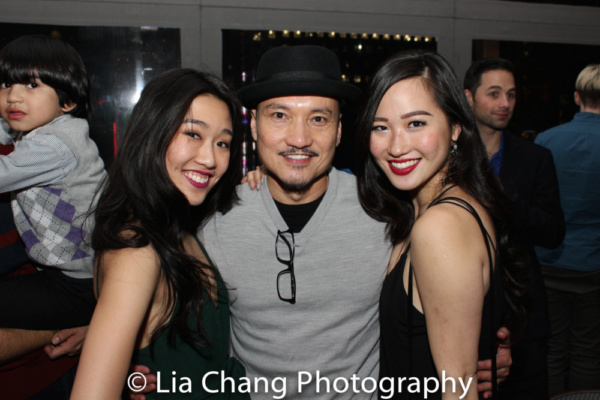Broadway's Viveca Chow Shares Her Advice on How to Nail Your BFA Audition

Viveca Chow is one of Broadway's rising stars having recently made her debut in the 2017 revival of Miss Saigon. In an effort to share her art, opinions, advice and more, she is now authoring the new blog Vivaaace.
We're featuring her recent post giving students all the advice and encouragement they need to nail their BFA auditions. Check it out below, then head over to Vivaaace.com to read more!
As college auditions are approaching, I hope to give you as much insight as possible about how to make your college audition experience a positive one. It's surreal that I auditioned for colleges 7 years ago! I completely understand how you're feeling - you're stressed, anxious, nervous, terrified & excited all at the same time. You don't know what you should wear. What should you sing? Is your song overdone? Breathe. All of those emotions are valid, but let's channel the negative emotions in a more productive way. Whether you're about to audition this coming year or you're doing your research, I hope this blog post will give you the tools you need to nail that audition & hopefully get into your dream BFA program!
CHOOSING YOUR SCHOOLS
Let's start at the very beginning & talk briefly about choosing your schools. I suggest that you look at every school possible & not just the ones you always hear about. The main thing with choosing your list of schools is that you don't get so wrapped up in the idea of a school rather than focusing on what the specific program offers. Reputation is important, but the training itself is even more important. Audition for everything. Read their curriculums. Reach out to current students. See what their schedule is like. Go on YouTube & look at videos of the school. Do your research!
UNIFIEDS
I auditioned at the Chicago Unifieds. If you're unfamiliar with Unifieds, you should look into it right now! Unifieds is where nearly all the MT schools in the country gather in one location (New York, Chicago or LA), so you don't have to spend a lot of money and time traveling around the country in a span of months to audition. The only downside is that you don't get the luxury of visiting the school itself. It can also get a little overwhelming having to schedule all your auditions in 3 days, so you have to make sure to stay on top of it - but it is 100% do-able! My overall experience was an awesome one, & know that schools do not put less weight on prospectives auditioning at Unifieds. Do as many walk-in's as you can as well.
MAKE A SPREADSHEET
I was scrolling through Instagram one morning & came across an article written by a fellow blogger, Maggie from Actor Aesthetic.She writes about how you should keep track of your whole application process & audition information on a spreadsheet. She really breaks it down for you & how you should stay organised/on top of your auditions. Back in the day, I also had my own spreadsheet very similar to the way Maggie suggests & it helped so much. The article is here, so click on it & give it a read.
AUDITION ATTIRE
Keep it smart, classy & put together. Wear makeup & do your hair. I wore a plain coloured dress & nude heels to all my auditions since that was the standard dress code at the time. Nowadays, I think you can be a little bolder with your outfit choices. I recommend a cute jumpsuit for the ladies with a pair of booties or a wrap dress! If you want some audition outfit inspiration click here. I have created a little shopping list for both men & women! Just add the item to your Amazon cart, checkout & you're good to go! Please be aware of the length of your romper or dress - that it's not too short or too revealing. Mary Jane heels or chunkier heels are great in audition settings because it gives you a little height but keeps you connected to the floor, unlike stilettos. Wear solid colours; avoid busy patterns since it will be distracting. For the men, wear a nice button down shirt with well-fitted pants & a pair of oxfords. Pops of colours are nice.
YOUR AUDITION BINDER
You should have an audition binder with all your audition music. Your music should be organised in a way where there should be the least amount of page turns. 3 hole punch it properly. Print it double sided. I don't recommend sheet protectors, but that's just a personal preference. If you do use sheet protectors, get the non-glare ones. Write the name of your song at the topic of the page along with what show it's from. Make sure your music is clearly marked. Label all the songs in your audition binder with tabs, so if they ask to hear another song, you can quickly find it.
MARKING YOUR SHEET MUSIC
Make sure your music is clearly marked: Start, End, Any Tempo/Time/Key Signature Changes, Any Cuts etc. Remember to have the time signature written where they can see it, especially if you're not starting at the beginning. Highlight any key signatures changes. If they're asking for 32 bars, stick to 32 bars. Not 33, not 40 - 32. Same applies for a 16 bar cut or if they have a time limit like 1 minute or 1 minute 30. If you sing more than what they're asking, they will know because these professors are all seasoned professionals. & since they have no clue who you are, you want to make the best first impression possible, & that includes you telling them that you're easy to work with as an actor/person because you can follow rules. You also shouldn't feel the need to sing more than they're asking because most of the time, they'll know within the first 8 bars whether you're what they're looking for.

SONG SELECTION
Choosing your audition selections can be a tricky thing. You don't want to sing songs that are majorly overdone or sung by iconic legends in the industry - Don't Rain On My Parade, Somewhere Over the Rainbow, Roses Turn etc. Find something age appropriate. For the ladies, try avoiding these songs: Pulled (Addams Family), Much More (The Fantasticks), Vanilla Ice Cream (She Loves Me), Screw Loose (Crybaby), On My Own (Les Mis). For the men, try avoiding Santa Fe (Newsies). You also want to avoid anything from the current Broadway repertoire. If you're curious as to 'why' or you disagree, please remember that this whole post is solely my opinion & it's just what I think will help you best. You don't want the people behind the table to roll their eyes internally once you start singing because it's a song they've heard 30 times already that day. You also don't want them to check out your audition & think about something else. For example, if you're a boy & you're singing Waving Through A Window (Dear Evan Hansen), they're going to think about the video of Ben Platt doing that song they saw the whole time you're singing & you don't want that. You want them to focus on you when you're performing your material. They'll already be exhausted, so don't give them any reason to check out!
Avoid songs that are hard for the accompanist to sight read (Sondheim). Songs which show your personality are always a plus. If you are belting in one of your selections, choose something that's more classical or mix-y for your second piece. You want to showcase your entire vocal and emotional range in 2 songs to the best of your ability. Play to your strengths. Choose songs that have higher stakes in the circumstances, instead of ones that sound 'pretty.' Other than showing that you have an amazing voice, you need to show them you can act! Make sure you know the basics about your song and the show you're singing from: what the show is about, at what point is the character singing the song, who you are/background on your character, who you're talking to, where you are, what your objective is, what your obstacle is, what changes from the beginning to the end, what your tactics are in achieving your objective. They might ask you about your acting circumstances.
To purchase sheet music, you can either google it, or email Michael Lavine at broadwaymhl@aol.com, my dear friend who's the ultimate sheet music guru in NYC! The first song you purchase from him will be $15 but every song thereafter is $5 after that. Incredible deal.
COMMUNICATING WITH YOUR ACCOMPANIST
Be nice to your accompanist. I can't even stress this enough. Say thank you. I always think that the accompanist is the most important person in the room because they are your other half when you're auditioning. They complete you. So make sure you respect their personal space when you approach them. Do not snap your fingers when giving them a tempo. I like to give my tempo tapping my hand on my chest so I can feel my tempo too. Be clear about your tempo. Practice giving your tempo before you walk into the room. Tell them what you'll be singing today and what show it's from. Let them know where you're starting and where you're finishing. Tell them whether you would like them to play a short intro (make sure this is marked in the sheet music), or if you would just like a bell tone (your starting note) before you start. Tell them if there are any cuts in the music (where you jump from one place to another that's not cohesively written). You don't need to tell them if you are going to speed up/slow down - this should be marked in your music & they can read. If they play something wrong, just keep going. Don't stop them & try to start over. It will leave a sour taste in everybody's mouth & you will ruin your audition that way. Just keep leading & they will try their best to catch up with you. Be specific when talking to your accompanist but not overbearing. Don't spend too long at the piano explaining things. If your accompanist does make a mistake, don't bitch about it in public after your audition. You don't know who's listening to your conversation, even if you're only talking about it with your parents. It's okay to be upset, but try & stay away from saying anything negative about anyone or any program in public. It won't make you look good. Even if your pianist messes up, so what. You might go out of tune or go flat when you sing sometimes too. They're human. So just breathe, because the people behind the table will most likely know if the accompanist played something wrong.
WHAT IF THEY DON'T HAVE AN ACCOMPANIST?
In this case, you have to make sure that all your accompaniment is pre-recorded. You want it to be good quality. Do it in a rehearsal space. If you don't have professional recording equipment, my advice to you is plug in any earphones with a mic (apple earphones are great) & record it that way on your Voice Memo app on your phone. You also need to invest in a speaker that will be loud enough so you can sing along with it. Doesn't need to be too fancy though. Maggie from Actor Aesthetic has also written an article about her favourite wireless speakers. Click here to check it out. After you have all your accompaniment cuts recorded, you want to make separate playlists for each "audition set" & not have all your cuts/songs in the same playlist. So if Song A goes with Song B for College A, put that into a singular playlist. For your next playlist, maybe it's Song A with Song C for College B...etc. The reason I say this is because I had a college audition where I forgot to separate my accompaniment tracks & after I sang my 2 songs, it continued to my third accompaniment track while I was already doing my monologue. For the entirety of my monologue, I had background music accompanying it which was very distracting for them! Also make sure you don't have the loop/on-repeat setting on.

SLATING
Say your name clearly. I never slate my full name anymore because that's what your headshot & resume is for, but you should definitely tell them your first name. I can't exactly remember the exact details but there was a study that showed positive correlation between subjects being more likely to get a second interview when they introduced themselves. Make sure it's conversational & not like a presentation. Be casual but professional. "Hello! How's everyone doing? My name is Viveca & I'll be singing ____ from ____." I like to tell them my name the minute I walk into the room & ask them how they're doing. & I tell them what I'm singing either when I'm by the piano or right before I sing. Whatever feels most comfortable to you! Make sure you're aware of the energy of the room. If they're not in a talkative mood, don't try & force extra conversation. Give them their space. If you feel that the energy of the room is a little down, just let it be. Stay grounded. Don't try to be perky & fix it. There is a difference between being perky & positive though. You do want to be positive! They're probably just tired so just do your best with your song while feeding off positive vibes. If they're not really in the mood, don't rush your audition either though. Occupy your space you deserve & then start your song. You are in control & you are in charge. Signal to the accompanist with a nod when you're ready.
BE PREPARED FOR ANYTHING
I remember that I had some great experiences and some not so great experiences back when I auditioned for colleges. I had people who talked over my audition, people on their phones, people who were rude when talking to me etc. So be prepared for anything. Stay calm & think before you speak. Stay gracious & try not to be sassy (since it can come off as rude to strangers). The most common thing is that you might be asked to do your song or monologue again in a different way. If this happens, take their note. Listen to them & digest it. Then do it again. Don't even think about it twice. Don't question what they're saying or be defensive about it. Even if it doesn't make sense to you that they're asking you to deliver your very dramatic monologue in a more comedic way, just try something different. When this happens, they want to see that you are a receptive actor responding to stimulus & thinking quick on your feet. It is most definitely not a personal attack on your acting choices. Just go with the flow & stay open!
Also think about why you want to be in their program & have a short answer prepared if they ask. Look over their curriculum to see if anything stands out to you. Is it a particular class you're really interested in? Do you want to follow in someone's footsteps that went to their school? Do they put on phenomenal productions? Are you looking to go to a college in the area? Who have taught masterclasses there in the past? Do they always have masterclasses? Do they offer film classes that you want to take? Do they have an exchange program where you can go to London for a semester? Do you want to double major & they would give you the option to do that? Do you know someone in their program that highly recommends it? Do you simply think their program is the best? You know where I'm going with this.
DANCE AUDITION
Bring everything to your dance audition: ballet flats, jazz flats, character heels, taps. You never know what they might ask you to do so it's better to be prepared. The common dress code for dance auditions is a coloured leotard with a skirt/skort. I like to wear a sports bra & high waisted leggings. You want have more of an energetic look at your dance audition, so think jazz instead of ballet. Avoid ballet skirts unless you're doing a ballet combination. Don't dress sloppily. Try to avoid black jazz shoes/character heels because it'll cut your line off. One thing I've noticed is that a lot of people show up to college dance auditions in sweatpants & loosely fitted clothing. This is not a dance class or the gym. Even if dancing is not your forte, look presentable & look like a dancer. Show off your body. Be proud of it. Get your hair out of your face. For men, a pair of tight-fitted stretchy pants (NOT cotton sweat pants) paired with a tight fitted workout shirt. Oh... & don't forget to wear a dance belt if you're wearing tights. Avoid wearing all black. Have some pop of colour (even if it's grey) somewhere. I've also made another shopping list for both the men & ladies who aren't sure of what to wear: click here.
The main thing about dance auditions is telling a story. Even if you don't consider yourself a strong dancer or you struggle with picking up choreography, that's okay! I completely understand because I feel the same way. The way I deal with dance auditions is by being really aware of my peripheral vision, so if I forget anything, I'm able to pick it back up by glancing at the person next to me. Practice smiling through dancing, even if you mess up. Don't look frustrated or frantic in the moments of trying to remember what comes next. Just stay calm, smile through it, do a sensible step-touch/keep moving your body & catch up with the others once you remember. It's important that you keep moving your body to keep the momentum going because if you stop abruptly, you're going to catch their eye immediately, whereas if you keep moving, they're probably not going to notice the 4 counts that you forgot because since you're moving, they assume you're still dancing the choreo, & by the time they look at you again, you would've picked it back up. You also want to tell a story through movement. Maybe the dance starts with a reach forward with your right arm. Why are you reaching that arm? How do you feel about reaching your arm out? Do you want something? Or are you throwing something away? When you give a story & have an opinion about why you are moving your body the way you are, you will get their attention even if you don't have the highest kick or a perfect pirouette. Don't feel self conscious. We all have our strengths & weaknesses.
CHOOSING MONOLOGUES
Ideally, you want to have at least 3 monologues prepared: 1 classical piece & 2 contrasting contemporary pieces. Make sure your monologues are from published plays & not a random monologue you found on the internet. Avoid film monologues as well. It's just not what most programs are looking for. Once you get into their program, they'll be plenty of time to work on your desired pieces from your favourite TV show. Avoid any sensitive topics such as body image issues, eating disorders & rape. In a similar approach to song choices, make sure you choose something that has a sense of urgency in it. Choose monologues that are active instead of passive/descriptive. What this means is that you want to be talking to your scene partner directly (asking questions/figuring things out/explaining your feelings), & not recounting an event of some sort. Again, choose age appropriate monologues. Avoid monologues with too much profanity unless it's brilliantly written. There is a list of overdone monologues here - AVOID THEM.

HEADSHOT & RESUME
Staple your headshot to your resume. Your name should be printed at the bottom of your headshot. Your resume should be easy to read. Don't overcrowd your resume; just list things that are relevant. List your most important/esteemed credits first. They don't have to be in chronological order. Always list your special skills because it can spark a conversation between you & the auditors. Make sure your contact information is on your resume. Eye colour, weight, hair colour etc. are not necessary. Put your height if you want.
STAY ENGAGED
I've sat in on college auditions before & one thing I've noticed is that a lot of people tend to check out during dance calls. Don't check out & stare off into the space. I know you'll be exhausted, but try & stay focused. Be present. Checking out can be misunderstood as losing interest in the audition.
DON'T ASK QUESTIONS FOR THE SAKE OF ASKING QUESTIONS
At the end of the audition, if they gather you all as a group & talk to you guys, they might ask if you have any questions. These questions should be related to their program, but don't ask a question for the sake of it or one where you can easily find the answer on their website. What I mean by the 'sake of it' is basically asking a question just so they'll remember your face. Instead, ask a question during the dance audition. Ask for clarification on a dance move or a transition. Otherwise, read the curriculum in full detail & see if you have any questions after reading it. It's okay if you don't have questions. If they ask you whether you have any questions during your singing/monologue audition & you don't have any questions, tell them honestly "nope! I read your full curriculum & I'm really excited about it all, especially ____." Or it doesn't hurt to say "I've read your full curriculum & I don't have any questions currently. But do you have any current students I could reach out to so that I can gain a better understanding of your program & their lifestyle within your conservatory/college should I have any questions in the near future?" Show your interest in their program. Be the most pro-active version of yourself you can possibly be.
BELIEVE IN YOURSELF
I truly wish you all the best of luck with your audition endeavors! Just remember that you can always re-audition or transfer to a program if you don't get into one the first time round or if you don't like the program you end up choosing. It's most definitely not the end of the world. I know a girl who got rejected from all 14 schools she auditioned for & now is a series regular in an ABC show written by Shonda Rhimes. My other friend got accepted to 1 BFA program & she didn't even end up doing Musical Theatre in college. Halfway through her sophomore year doing her 'muggle' major she booked a Broadway show & is now leading a Broadway National Tour. Tons of people go to college for majors not even related to theatre, & end up having very successful careers. Everyone has their own journey & you will figure out yours! Don't give up hope. Don't compare yourself to other people. Their successes are not your failures. Be prepared, have fun & enjoy the process! You got this.
If you found this blog post helpful, please share it on your social media pages - Facebook, Instagram, Twitter. Feel free to send it to any prospective students you may know going through/about to go through this process. Let's help each other out. Don't forget to visit vivaaace.com to subscribe so you can get immediate updates on new posts!
Videos


